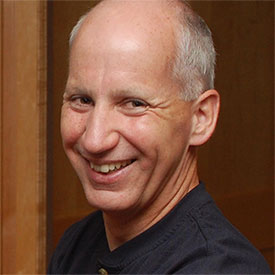Bjorn Sandstede ADE’09 hon. is a Royce Family Professor of Teaching Excellence, the Director of the Data Science Initiative (DSI), and Professor of Applied Mathematics.
Why did you choose to come to Brown in 2008?
I came for many reasons. Brown has one of the strongest applied mathematics departments in the U.S., with an exceptionally solid faculty and a terrific graduate program. I was also attracted by the excellent reputation of Brown's undergraduate program. And last but not least, I had both a prior professional and a personal connection. I worked here as a postdoctoral fellow for 15 months in the mid 1990s and met my partner, Alice, in 1995 in the applied math department. We both love Providence for its charm and character.
 As one of the founding principal investigators of the National Science Foundation grant that established Brown's Institute for Computational and Experimental Research in Mathematics (ICERM), what does it mean to the University to host ICERM on campus?
As one of the founding principal investigators of the National Science Foundation grant that established Brown's Institute for Computational and Experimental Research in Mathematics (ICERM), what does it mean to the University to host ICERM on campus?
ICERM has significantly raised Brown's visibility in the mathematical sciences community in the U.S. and throughout the world. By hosting many short- and long-term programs, ICERM also provides an exceptional opportunity for students and faculty to engage with a constant stream of researchers from other institutions. The infrastructure available through ICERM has also helped Brown organize additional events, offer research opportunities to Brown undergraduates—allowing me, for instance, to work with 20 undergraduate researchers including six Brown students during summer 2016—and obtain additional grants.
Where do you see the DSI headed? What are its priorities?
The massive increase of data available to us, along with amazing advances in algorithms and computing power, have created possibilities we never imagined. At Brown, we want to drive methodological innovation while paying attention to the social and cultural impacts of this data and, at the same time, think about novel ways to empower students to become literate with data and their analysis. Our mission? To serve as a hub for research and education in the applications, theoretical foundations, and societal impacts of data science. How will we do this? By hiring new faculty, organizing networking and research events that connect faculty across campus, and offering research grants that help establish new collaborations. We will create and coordinate opportunities for data science training for graduate students and postdoctoral fellows and plan to develop a certificate program in data fluency for Brown undergraduate students.
Lastly, data science does not exist in a vacuum. It affects our lives in many positive ways—from generating book and movie recommendations to making self-driving cars a reality—but also raises many concerns about privacy and biases in situations like, for instance, predictive policing. I firmly believe that we need to work with humanists and social scientists to explore the impact of data science on individuals and society as a whole. I am particularly excited about a panel discussion on "Algorithmic Justice: Race, Bias, and Big Data" that we will co-host in February 2019 with the Center for the Study of Race and Ethnicity in America to critically examine the ways in which data science algorithms can perpetuate racial biases.
How does the study of applied mathematics benefit society?
Applied mathematics lies at the heart of many technological advances: Weather forecasts and climate models, secure credit card transactions, internet search engines, and aircraft design (to name but a few) would not be possible without the algorithms and theoretical foundations developed by mathematicians. Applied mathematics can also help inform societal choices by, for instance, helping us understand voting systems and social media interactions.
Brown prides itself on recruiting strong teachers as well as strong researchers. As a Royce Family Professor of Teaching Excellence and previously a recipient of the Philip Bray Award for Teaching Excellence, teaching obviously matters to you. Why is that?
Teaching allows me to share my passion for math with others. I find it very inspiring and motivating to work with students. Teaching also provides an opportunity for me to encourage students to think about STEM (science, technology, engineering, and math) fields as potential career paths. And the students are incredibly creative, curious, and engaged—which makes Brown such an exciting place to be!